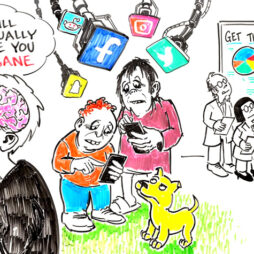InformationWeek | by Rob Preston | Sept. 29, 2008
One school of thought is that if you treat your people right, they’ll be far more motivated and equipped to engage with (and maximize returns from) your customers.
The customer comes first. It’s considered a business management truism. The way to boost profits and market caps is to focus on the people who buy your products. “Delight” them, as former GE chief Jack Welch would say. Create relationships that foster brand loyalty and return business. Management experts C.K. Prahalad and M.S. Krishnan go a step further, exhorting companies to “co-create value” with their customers, one customer at a time.
There’s really no arguing with this approach, but there’s another school of thought: The way to get customers to beat down your door is to put your employees first. The rationale: If you treat your people right, they’ll be far more motivated and equipped to engage with (and maximize returns from) your customers.
Vineet Nayar, CEO of HCL Technologies, coined Employee First several years ago as he set out to transform HCL from an Indian hardware supplier to a global provider of high-end technology services. Taken at its face value, HCL’s Employee First, Customer Second (EFCS) philosophy is still something of a heresy in business management circles, with its implied emphasis on internal matters.
But you need to understand the ultimate goal of employee-centricity, at least the variety that Vineet and others are preaching. If it were just a return to the dot-com era’s pinball-machines-in-the-office-lounge, bring-your-pet-to-work kind of environment, it wouldn’t be worth a second thought. At its core, however, there’s far more to putting employees first than showering employees with perks.
“From the start, I was clear: Employee First was not about free lunch, free buses, and subsidies,” Vineet is quoted as saying in an August 2007 Harvard Business Review article. “It was about setting clear priorities, investing in employees’ development, and unleashing their potential to produce bottom-line results.”
t also was about changing the internal culture. One feature of an intranet that sits at the center of EFCS is the Smart Services Desk, a sort of trouble ticket system whereby employees log in questions and critiques, posted for all 55,000 worldwide employees to view. Company policy says those employees who open a ticket must get a response within 24 hours, and only the employee initiating the ticket can close it. Vineet himself answers a hundred questions a week under a related program.
All HCL managers receive 360-degree reviews that include 1 to 5 ratings on their effectiveness, communications skills, and other areas, from direct reports and others. Vineet posts his review on the intranet, though one wonders how critical the underlings dare to be. Open communications at HCL also includes lots of videoconferencing, online collaboration, and town hall-style face-to-face talks. The goal, at least, is to create an environment where talking the truth is prized more than making excuses and covering your butt.
. . . more


